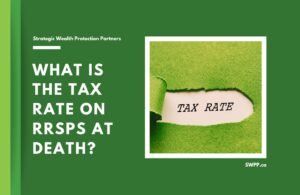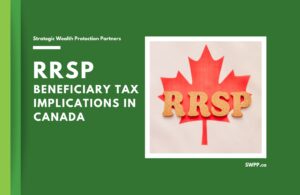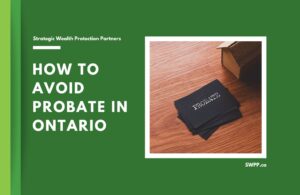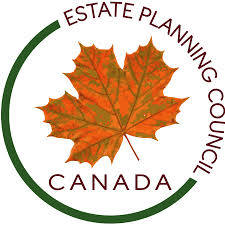Written by Ron Cooke, President & Founder of Strategic Wealth Protection Partners in Ontario, CEA®, Member of the Estate Planning Council Canada
No Inheritance Tax Doesn’t Mean No Tax
Canada does not have an inheritance tax—but that doesn’t mean you’re home free.
If you inherit money, investments, or property from a loved one, you won’t have to pay a specific tax just for receiving it. However, this doesn’t mean taxes are completely off the table. Instead of taxing the person who inherits, Canada taxes the estate of the person who passed away.
That means any taxes owing—like income tax or capital gains—are paid by the estate before the inheritance is passed along. So while you won’t get a tax bill in the mail for inheriting, taxes can still affect what’s left to inherit.
In addition, if you sell property or assets that you’ve inherited, you’ll have to pay tax on any capital gains. In other words, if the inherited assets you sell have increased in value since you inherited them, you’ll have to pay tax on the increase in value of the assets.
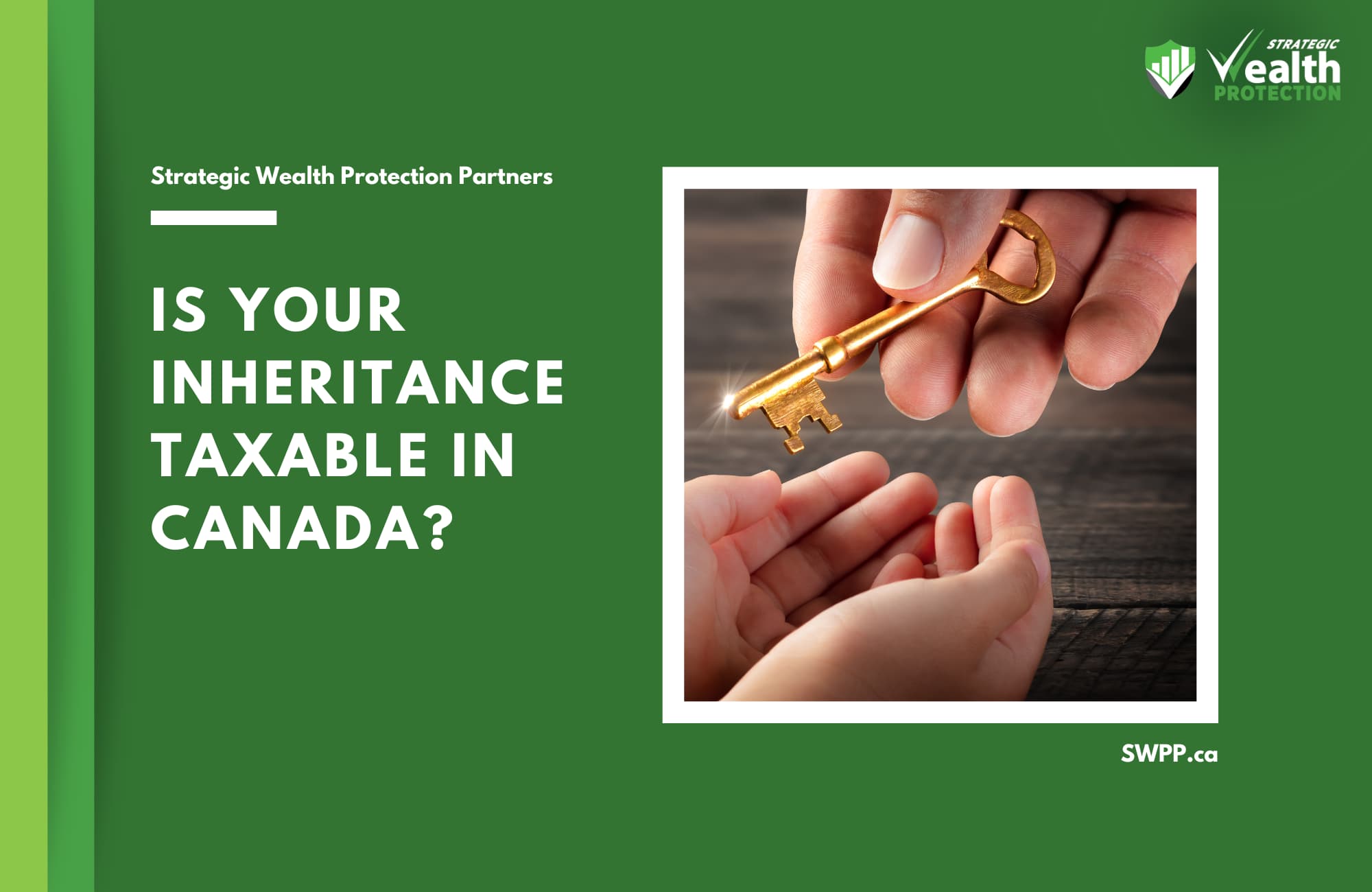
Table of Contents
- How Inheritance Taxes Work in Canada
- 10 Key Points about Inheritance Tax Every Canadian Should Know
- Understanding Canadian Inheritance Tax Laws
- Is There an Estate Tax in Canada?
- Do Beneficiaries Have to Pay Taxes on Inheritance?
- Strategies to Minimize Taxes on the Final Tax Return Upon Death
- Tax Implications of Inheriting a Home or Other Real Estate
- Tax Treatment of Inherited Registered Accounts
- The Role of Probate in Estate Settlements
- What Happens When There Is a Surviving Spouse?
- Foreign Inheritance Tax in Canada
- How Can Life Insurance Be Used to Mitigate Inheritance Taxes?
- Common Questions
How Inheritance Taxes Work in Canada
When you’re faced with the possibility of inheriting money or property, one of the first questions that likely comes up is, “Is inheritance taxable in Canada?”
Will you owe taxes on the assets you’re set to receive? And what impact will taxes, probate fees, or capital gains have on your inheritance?
So let’s break down how taxes work after someone dies.
When someone dies, their estate has to file a final tax return.
This return includes all income earned up to the date of death, and any capital gains on assets that have increased in value. For example, if your parents’ cottage grew in value over the years, the estate may owe tax on that gain, as if it were sold.
These taxes are paid out of the estate’s assets before anything is distributed. There may also be probate fees depending on the province.
So while you don’t pay tax to receive an inheritance, taxes may shrink the size of what’s left to give.

10 Key Points about Inheritance Tax Every Canadian Should Know
If you’re just here for a quick overview, these 10 key points cover the basics that everyone should know:
1. Canada does not have an inheritance tax.
You won’t be taxed just for receiving an inheritance. Instead, taxes apply to the deceased’s estate before anything is passed to beneficiaries.
2. Estates must pay tax on capital gains and income.
When someone dies, the Canadian Revenue Agency (CRA) treats their assets as sold at fair market value. This can create capital gains tax on properties, investments, and RRSPs.
3. Inheritances are not reported as income for beneficiaries.
You don’t report an inheritance on your personal tax return unless the money starts generating income, like interest or rental income.
4. RRSPs and RRIFs can trigger large tax bills—unless passed to a spouse.
If a spouse or dependent inherits an RRSP or RRIF, it can roll over tax-free. Otherwise, it’s taxed as income in the deceased’s final return.
5. Real estate is subject to capital gains tax before it’s inherited.
The estate pays tax on any increase in property value. The recipient doesn’t pay tax at the time of inheritance, but may owe tax if they sell later.
6. Probate fees vary across provinces and can be significant.
In Ontario, the Estate Administration Tax is 1.5% on estates over $50,000. Planning can help reduce what goes through probate.
7. Life insurance can be a smart tool to cover estate taxes.
The payout is tax-free and can prevent the forced sale of assets to cover taxes owed by the estate.
8. Gifting property before death can create a tax bill.
Giving away real estate or investments during your lifetime triggers capital gains tax, just like selling them.
9. Foreign inheritances are usually tax-free, but income from them isn’t.
If you inherit from abroad, the gift isn’t taxed, but any income it generates in Canada must be reported.
10. Trusts can help reduce taxes and control distributions.
Using a trust, such as a spousal or family trust, can defer or reduce taxes and help manage how your estate is passed on.
Now, if you want to dig a little deeper, keep reading! We’ll cover how inheritances are taxed in Canada in more detail.
📖 Related Read: What Is the Cost of a Living Trust in Canada?

Understanding Canadian Inheritance Tax Laws
Inheritances in Canada are not taxed the same way as they are in some other countries.
Canada does not have a separate inheritance tax or estate tax like the U.S. or the U.K. Instead, when a person dies, their assets are considered to be sold at fair market value. This is called a “deemed disposition.”
If those assets have increased in value—like a cottage, rental property, or non-registered investments—capital gains tax may apply.
The estate pays this tax before distributing anything to beneficiaries.
Registered accounts like RRSPs or RRIFs are also taxed as income in the year of death unless transferred to a spouse or dependent. In some cases if your RRSPs or RRIFs are transferred to a spouse they could cause a tax bill for the estate, it must be done properly.
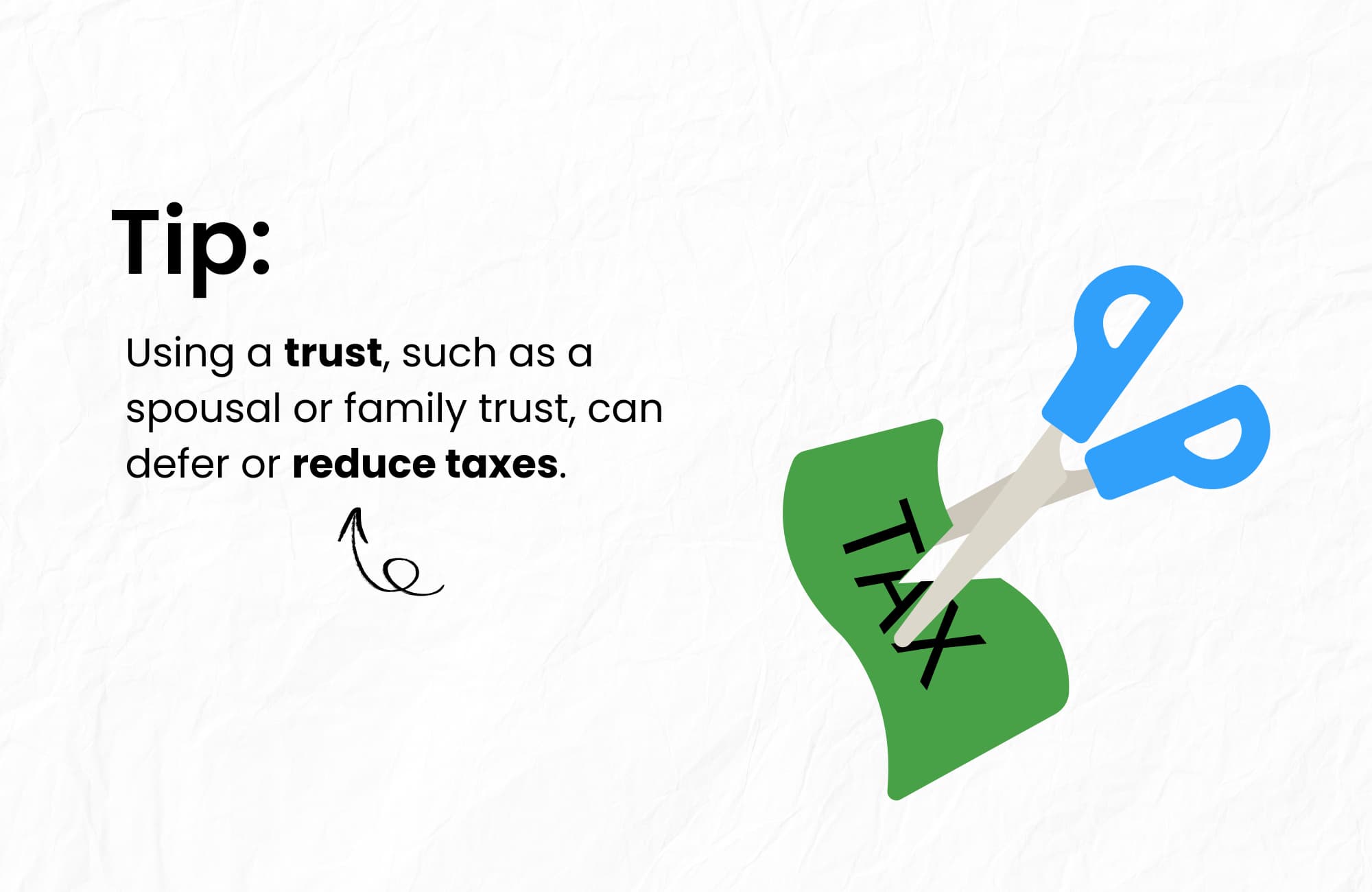
Is There an Estate Tax in Canada?
Just like there is no inheritance tax in Canada, we also don’t have a formal “estate tax.”
In Canada, when someone dies, the government treats all of their capital assets—like real estate, stocks, and other investments—as if they were sold right before death. If those assets have gone up in value, the estate must report the capital gains and pay tax on them in the final tax return.
Example:
If your parent bought a second property for $200,000 and it’s worth $600,000 at death, the estate may owe tax on a $400,000 gain. These taxes are paid out of the estate’s value, which can reduce how much is passed on. So, while there’s no estate tax bill, tax still plays a big role.
Some provinces, like Ontario, also charge probate fees, officially known as an Estate Administration Tax. This fee is based on the value of the estate and must be paid before the will can be acted on. While there’s no estate tax per se, these other costs can still be significant and should be planned for.
📖Related Read: How Do I Avoid Capital Gains Tax on Inherited Property in Canada?

Do Beneficiaries Have to Pay Taxes on Inheritance?
No, beneficiaries in Canada do not pay tax on the inheritance they receive.
Once the estate has settled all taxes—like income tax, capital gains, and probate fees—the remaining assets can be distributed. These inheritances are not considered income for the beneficiary, so they won’t be taxed when received.
Strategies to Minimize Taxes on the Final Tax Return Upon Death
Good planning today can reduce the tax bill your estate faces tomorrow.
One common strategy is naming a spouse as the beneficiary on registered accounts like RRSPs or RRIFs. This allows the funds to roll over tax-free, instead of triggering a full tax hit at death. Another option is using a Tax-Free Savings Account (TFSA), since withdrawals are never taxable—even after death.
You can also consider gifting assets during your lifetime, especially ones that haven’t appreciated much. For large assets like cottages or investment properties, some families use joint ownership or trusts to pass them on more efficiently.
Life insurance can also be used to cover the final tax bill, ensuring heirs receive their full inheritance. Life insurance payouts are not taxable, making them a useful estate planning tool.
When set up properly life insurance can be an excellent solution and by using some creative strategies the insurance can almost be free. Planning with a professional advisor or estate expert can help you choose the best options for your situation.
Tax Implications of Inheriting a Home or Other Real Estate
Inherited real estate isn’t taxed when you receive it. But the estate may owe taxes first.
When someone passes away, any real estate they owned—like a house, condo, or cottage—is treated as if it were sold at fair market value. As mentioned previously, this is called the deemed disposition rule.
If the property increased in value since it was bought, the estate must pay capital gains tax on the growth. For example, if a vacation home was bought for $150,000 and is now worth $1,000,000, the estate may be taxed on a $850,000 gain.
The principal residence exemption can reduce or eliminate tax on a primary home.
However, this exemption doesn’t apply to secondary properties, like cottages or rentals. Once taxes are paid by the estate, you can inherit the property tax-free, but future gains after you inherit may be taxed when you sell.
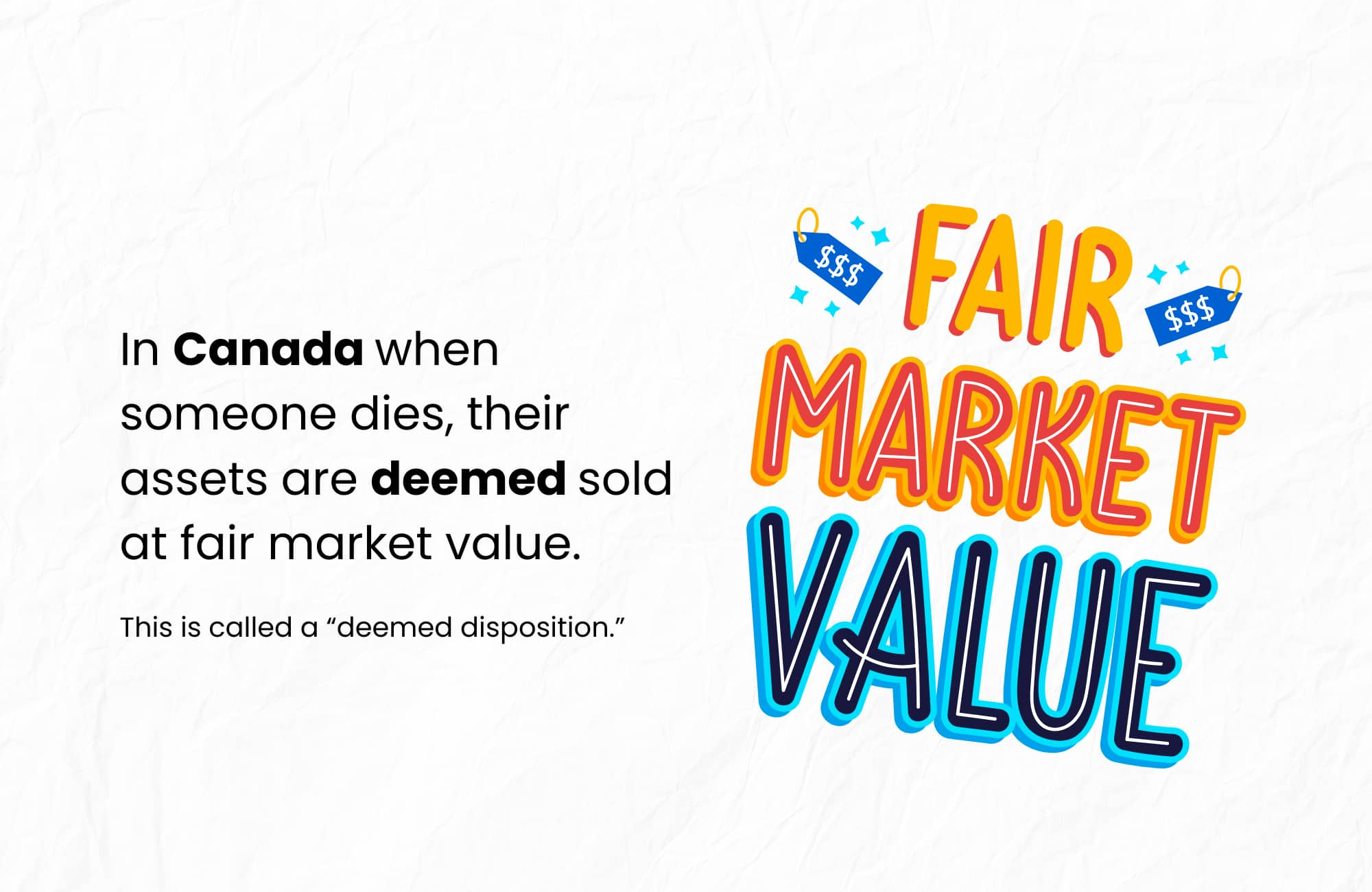
Tax Treatment of Inherited Registered Accounts
The tax impact of inheriting a registered account depends on the type of account and who the beneficiary is.
When someone dies with an RRSP or RRIF, the full value is usually added to their final income for the year, which can create a large tax bill. But if the beneficiary is a spouse, common law partner, or financially dependent child or grandchild, the account can often be rolled over tax-free into their own RRSP or RRIF.
This defers the tax until the beneficiary withdraws the money.
TFSAs work differently—there’s no tax at all on the value at death, and a spouse can take over the account or receive the funds tax-free. Non-spouse beneficiaries, like adult children, can receive the funds from a TFSA tax-free, but they can’t keep the account growing tax-free after that.
Naming beneficiaries directly on these accounts can also help avoid probate fees.
The Role of Probate in Estate Settlements
Probate is the legal process that confirms a will is valid and gives the executor authority to act.
In Ontario, probate is officially called a Certificate of Appointment of Estate Trustee. It’s usually required before banks, insurance companies, and land registries will release assets. The executor can’t distribute the estate until probate is granted.
This process also comes with a fee—known as the Estate Administration Tax—which is based on the total value of the estate. As of now, the first $50,000 is exempt, and the rest is charged at 1.5%. Some assets, like jointly held property or those with named beneficiaries, may bypass probate. Planning ahead can help reduce delays and costs.
This table provides an approximate overview of probate fees in Canada as of this writing. For the full details on your province or territory, view this PDF or look up the exact numbers for your place of residence.
| Province/Territory | Probate Fee | Key Notes |
| Ontario | 1.5% | Called Estate Administration Tax. 1.5% on amounts over $50,000. |
| British Columbia | 1.4% | No fee for first $25,000; 0.6% on amounts between $25,000 and $50,000. 1.4% on amounts over $50,000. (+) |
| Alberta | $35 to $525 flat fee | No percentage fee. Scaled flat rates up to $525. (+) |
| Saskatchewan | 0.7% | $7 per $1,000. (+) |
| Manitoba | No probate fee | Probate fees were eliminated in Manitoba as of November 6, 2020. (+) |
| Quebec | No probate fee | Notarial wills bypass probate; others may need court approval. |
| New Brunswick | 0.5% | 0.5% on amounts over $20,000. Scaled flat fees for estates between $5000 and $20,000. (+) |
| Nova Scotia | 1.695% | Scaled fees. 1.695% + $1,002.65 on amounts over $100,000. (+) |
| Prince Edward Island | 0.4% | Scaled fees. 0.4% + $400 on values over $100,000. (+) |
| Newfoundland & Labrador | 0.6% | $60 plus 0.6% on estates over $1,000. (+) |
| Yukon | Max $140 flat fee | $140 on estates over $25,000 |
| Northwest Territories | Max $400 flat fee | Tiered flat fees. Max fee is $435 on estates over $250,000. |
| Nunavut | Max $400 flat fee | Tiered flat fees. Max fee is $400 on estates over $250,000. |
What Happens When There Is a Surviving Spouse?
Special tax rules allow assets to pass to a surviving spouse without immediate tax.
When a spouse or common law partner inherits assets—like a home, RRSP, RRIF, or other investments—Canada’s tax laws generally allow for a tax-free rollover. This means the assets transfer to the surviving spouse without triggering capital gains or income tax at that time.
For example, an RRSP can be rolled into the spouse’s RRSP or RRIF, deferring tax until withdrawals begin.
With real estate and non-registered investments, the tax is also delayed. These assets pass to the surviving spouse at the deceased’s original cost base (the original purchase value), which delays the capital gains tax.
So if the deceased bought a cottage for $200,000, that value (i.e. cost base) carries over.
No capital gains tax is owed until the spouse or common law partner later sells the asset. And only the increase in value from the original $200,000 will be taxed.
This helps protect the spouse from a sudden tax bill and keeps the estate intact.

Foreign Inheritance Tax in Canada
Inheritances from other countries are usually tax-free in Canada, but there are important details to watch for.
If you’re a Canadian resident and receive an inheritance from outside Canada, you generally don’t pay tax just for receiving it. The money, property, or investments are not considered income.
However, if the inheritance earns income—like rent, interest, or dividends—that income must be reported and taxed in Canada. You may also need to report large foreign assets to the Canada Revenue Agency (CRA), especially if their total value is over $100,000.
Some countries do charge inheritance or estate taxes. In that case, the foreign estate may pay tax before you receive anything. Canada won’t charge tax again, but you won’t get a refund for taxes paid elsewhere. Always check local laws in the country of origin and consider talking to a cross-border tax expert for complex situations.
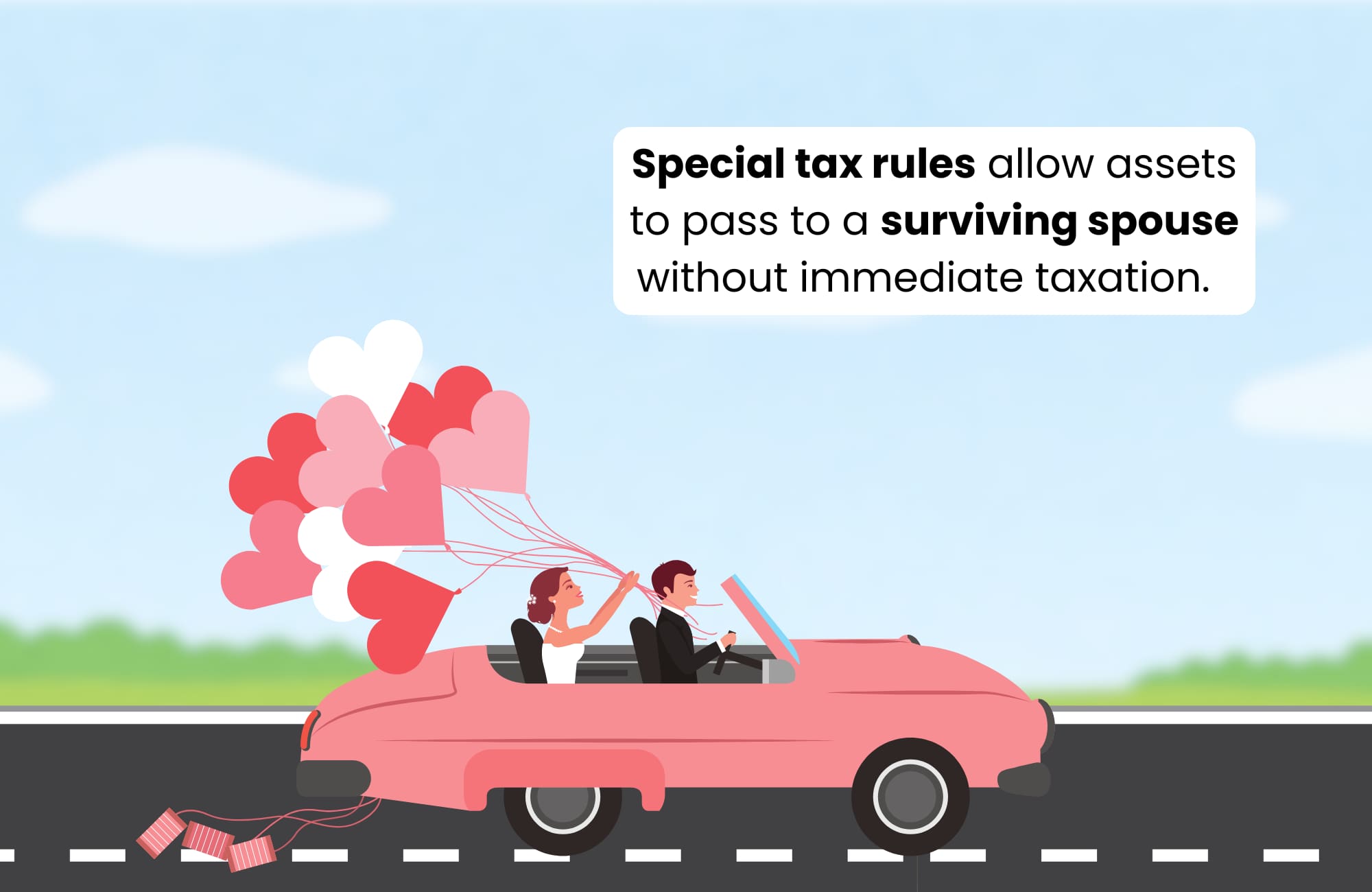
How Can Life Insurance Be Used to Mitigate Inheritance Taxes?
Life insurance can help cover estate taxes and protect what your heirs receive.
When someone dies, their estate usually owes taxes, especially if there are capital gains on real estate, investments, or RRSPs. Life insurance can provide a tax-free payout that helps cover those costs, so assets don’t have to be sold quickly or at a loss. For example, if your estate is expected to owe $1,000,000 in taxes, a life insurance policy for that amount can pay the bill and leave the rest of the estate untouched for your heirs.
Permanent life insurance, like whole life or universal life, can also build cash value over time in a tax deferred account. This creates a way to grow wealth inside the policy while keeping the death benefit intact. Business owners and high-net-worth families often use this strategy to pass on more tax-free value.
By naming a beneficiary directly on the policy, the payout skips probate, saving time and fees.
Life insurance isn’t just for income replacement—it’s a smart tool to preserve what you’ve worked hard to build. In some cases you can borrow back the money you deposit into an insurance policy to reinvest in another investment, freeing up your money to multiply its growth.

Common Questions
What are the tax implications of gifting property before death in Canada?
When you give property as a gift during your lifetime, it’s treated as if you sold it at fair market value.
If the property has increased in value, you may owe capital gains tax. Gifting doesn’t avoid taxes—it often just moves the tax bill earlier.
How does the CRA treat inherited property for tax purposes?
Inherited property is not taxed when received.
But before it’s passed on, the deceased’s estate must report capital gains if the property rose in value. The CRA taxes the estate, not the beneficiary, unless the property earns income after it’s inherited.
Do you have to report inheritance money to the CRA?
No, you don’t need to report inheritance money to the CRA as income.
However, any income earned from that inheritance—like interest or rent—must be reported. The inheritance itself is not taxable, but what you do with it can create tax obligations.
What is a deemed disposition?
A deemed disposition is when the CRA treats property as sold, even if it wasn’t.
This happens when someone dies or gifts property. If the asset increased in value, the estate or person gifting may owe capital gains tax based on that growth.
Can using trusts lower the deceased’s final tax return?
Yes, in some cases. Trusts can help control when and how income is taxed.
A spousal trust can defer taxes until the second spouse dies, and other trusts may help split income among beneficiaries. However, trusts have rules and costs, so planning is key.
What is a living inheritance in Canada?
A living inheritance is a gift you give to loved ones while you’re still alive.
For example, helping a child buy a home could be done through a living inheritance. It’s not taxable when given, but depending on the asset, you may owe tax on any capital gains from the gift.
Discover How to Minimize Taxes and Secure Your Legacy
Did you know that without a solid estate plan, taxes and fees in Ontario could claim a significant portion of your wealth?
If you’ve worked hard to build your business, investments, and properties, protecting your legacy for your loved ones is critical. At Strategic Wealth Protection Partners, we specialize in helping high-net-worth individuals in Ontario secure their financial futures.
Our Living Estate Plan is designed to:
- Reduce estate taxes and probate fees.
- Simplify wealth transfer to your loved ones.
- Reflect your values and priorities in every detail.
Your Legacy Matters
With our personalized guidance, we’ll help you navigate options like Living Trusts to protect your assets and ensure your family’s peace of mind. Contact us today to book your Living Estate Plan Consultation and take the first step toward a secure future.
Schedule a Living Estate Plan Consultation
Planning your legacy is about more than numbers—it’s about ensuring your family remembers you and your values are honoured for many years to come.
Estate planning and trusts can feel overwhelming, especially if it’s your first time. That’s why we’re here.
With our simple, 5-Step Living Estate Plan, we make the process easy, helping you create a comprehensive estate plan or trust that protects your assets from taxes and probate fees while preserving your legacy. Tools like The Final Word Journal capture your story, wishes, and essential details like accounts and end-of-life plans, ensuring your family has clarity and comfort.
Take the first step today—schedule a consultation call and give your family the ultimate gift: peace of mind and the assurance they were always your priority.
Read More
If you’re starting your estate planning process, you may find these articles helpful:
- How to Avoid Inheritance Tax on a House in Canada
- Do Beneficiaries Pay Tax on Inheritance in Canada?
- How Do I Avoid Capital Gains Tax on Inherited Property in Canada?
- Inheritance Tax Ontario: Everything You Need to Know
- Estate Tax Canada Guide
About the Author
RON COOKE, PRESIDENT & FOUNDER OF STRATEGIC WEALTH PROTECTION PARTNERS

With over 30 years in financial services, I’ve seen the challenges families face when a loved one passes—lost assets, unnecessary taxes, and emotional stress. That’s why I created the Living Estate Plan, a comprehensive process to protect assets, eliminate estate and probate fees, and create legacies that are remembered for many years to come.
This plan ensures your family receives not just your wealth, but a meaningful reminder of your care and love. Tools like The Final Word Journal capture your story, wishes, and essential details, offering clarity and comfort during difficult times.
Your final gift should be more than money—it should be peace of mind, cherished memories, and an organized estate.
Schedule a Call
Schedule a 30-minute consultation call with Strategic Wealth Protection Partners.
Click HERE to schedule a consultation.


